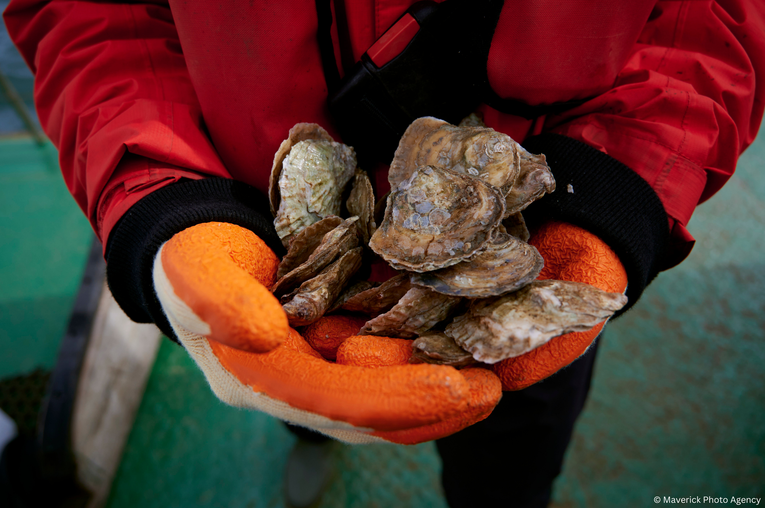
Positive ocean news: November 2023 edition
To spread some much-needed ocean optimism, we've rounded up some good news stories for our seas from this month.
Two new deep-water coral reefs discovered

Credit: Schmidt Ocean Institute
Six months after the first deep-water reefs were discovered around the Galápagos Islands, two more have been recorded/found.
The reefs were found between 370 and 420 metres below the surface in the Galápagos Marine Reserve, one of the world’s largest marine protected areas. One of the cold-water reefs measured 250m long, while the other spans over 800m.
The reefs were described as “forests or fields of flowers”, supporting an abundance of species such as skates, sharks, stony coral species, crustaceans and fish.
The research team will analyse video footage taken at the sites and will count the animals captured. Katleen Robert, one of the scientists, said, “I wouldn’t be surprised if we find over 100 different species that are in there.”
Read more on the Mongabay website
Native oyster nursery installed in Belfast harbour
Although native oysters were thought to be extinct in Northern Ireland for over 100 years, similar oyster nurseries installed in recent years through restoration projects have shown great success at reintroducing the species.
It’s hoped that the larvae produced by the oysters will form a reef on the seabed, which will act as a habitat for marine species in the area.
Read more on the Irish News website
Device developed to turn water, sunlight and carbon dioxide into green fuel
It’s hoped that ‘floating factories’ made of these leaves could be placed in lakes and estuaries, where they would use sunlight, water and carbon dioxide to produce non-fossil fuels which could be used in cars and ships.
Erwin Reisner, a professor at Cambridge University, said that the development will help ‘defossilise’ the economy. “We will no longer be burning ancient sources of carbon – coal, oil and gas – and adding greenhouse gases to the atmosphere, a process that is doing so much damage at present.”
Read more on the Guardian website
Designer uses seaweed to produce sustainable clothing and accessories

Credit: Ben Wicks
Katrín Þorvaldsdóttir, a designer in Iceland, has been working with seaweed for 30 years, and says her “mission in life is to bring out the beauty in life and in seaweed.”
Katrín heads to the shore to collect seaweed, before bagging and labelling it with the date and place it was gathered. Before being fashioned into textiles, a sustainable treatment is applied to the seaweed.
Jewellery, masks, shoes and clothing are created from the seaweed Katrín has collected, which she says has enormous potential a sustainable material.
Read more on the Guardian website
Dominica announces creation of sperm whale reserve
It will be the world’s first marine reserve aimed at safeguarding the species, of which Dominica has 200-300, and will expand the country’s marine protection by 70%.
The reserve, which will be around half the size of London, will include a feeding and nursing area for whales, as well as protecting them from the threats of fishing gear entanglement, boats, pollution and tourism.
Dominica’s prime minister, Roosevelt Skerrit, said, “We want to ensure these majestic and highly intelligent animals are safe from harm and continue keeping our waters and our climate healthy.”
Read more on the Mongabay website
Footage of dolphins raiding crab traps highlights problem solving skills of creatures

Credit: Dolphin Discovery Centre Bunbury
The world’s first footage of dolphins stealing the bait from crab traps has been captured off Western Australia.
The dolphins can be seen using their eyes, teeth and beak-like rostrum to remove the bait from crab traps and eat it, without being caught.
Although dolphins have been cleverly taking the bait from traps for decades, Axel Grossman from Dolphin Discovery Centre Bunbury, who captured the footage, said, “We had no clue that the dolphins were acting to such an extent, through so much effort, learning and physical and mental problem solving [to do so].”
Bottlenose dolphins are known to be highly intelligent, and dolphin experts believe that the footage helps offer insight into their behaviours as well as opportunities for further research.
Read more on the ABC News Australia website
Indonesia launches roadmap for seagrass protection
Indonesia is home to more than 10% of the world's seagrass meadows, with an estimated 582 square miles of coverage in its waters. This is significantly lower than the 11,600 square miles estimated in 1994, with global seagrasses declining at a rate of around 7% each year.
Restoring seagrass meadows will help Indonesia achieve its greenhouse gas reduction goals, as seagrass is a valuable carbon store – sequestering 35x more carbon than tropical rainforests, per area.





